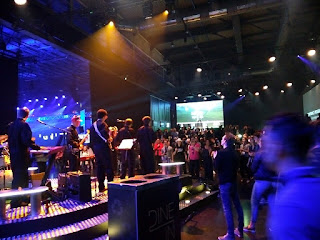As Schneider Electric's Innovation Summit entered its home stretch on day two of the event, the Oilholic touched on two key energy consumption segments - datacenters and smart cities.
Starting with the latter, as urban centres expand, so does their power demand.
It has led many to envision digitally-premised 'smart' cities with efficient energy and communications systems, dwellings, offices, and, a whole new way of urban living in the digital age.
Among the many things that Schneider Electric is attempting in this space, are what the company describes as "Impact Buildings" - spaces that are digitally intelligent, energy efficient, and "designed with people in mind."
For the company these building projects showcase how technology, sustainability, and innovation can come together to create spaces that are not only high performing and low carbon, but also serve as real world examples of what is possible today.
They typically deploy digital energy solutions and have smart sensors for data gathering for management, maintenance and efficient day-to-day running of the building from workspace management to lighting and temperature control.
The first of these from Schneider Electric - NEST impact building - was launched in Dubai in May. It was great discussing NEST's potential with the key leadership team behind it all - Frederic Godemel, EVP Energy Management at Schneider Electric and Manish Kumar, EVP Digital Energy at Schneider Electric.
While Godemel and Kumar outlined the headline case and technologies underpinning the move, it was fascinating listening to Matthew Proctor, Global Sales Lead, Enterprise Software, at Schneider Electric, offer a glimpse into the live-feed visual display of the digital footprint of the building.
This blogger is also grateful to Martin Jensen, EMEA WD Division President at global real estate and property management firm JLL (who are partnering with Schneider Electric on the impact buildings), for discussing their commercial future.
Away from smart buildings and smart cities, yours truly also took time out explore what Sebastian Bøtcher, Sales Director, Secure Power at Schneider Electric Denmark, described as addressing the "chip to chilling" aspect of hyperscale datacentres, supercomputers and AI.
By that token, Bøtcher's team is providing solutions to the Danish Centre for AI Innovation or DCAI, a company established to run and operate Gefion, Denmark’s first AI supercomputer. It's named after a goddess in the country's mythology.
DCAI is funded by the Novo Nordisk Foundation and by EIFO. During a visit to the site, on the sidelines of the summit, the Oilholic met Nadia Carlsten, CEO of DCAI, her colleague Ali Syed, who's the SVP of Infrastructure, and, of course Bøtcher himself.
Carlsten said DCAI's work offers a testament to the seriousness with which Denmark is approaching the potential, premise and deployment of AI solutions and services and their growing role in the Danish economy.
"Our mission is to lower the barrier to access the most advanced computing capabilities in Denmark in particular, and the region in general. We work with customers from academia, startups, and enterprise to accelerate AI research and innovation," Carlsten said.
Syed added that the facility is not just a deployment hub for AI in Demark, but also a mission critical learning and testing ground as hyperscale datacentres proliferate globally.
"It is as much about the direction of travel, as it is about recognising the power of AI in step with our partners and end users," he added.
And Bøtcher brought Schneider Electric's "electrify, automate & digitalize" everything message into the mix, noting that: "We are part of that learning and collaborating ecosystem, as AI rises in prominence, and there is a growing clamour for the solutions we offer."
"We hope to extrapolate our infrastructural and digital learnings from DCAI to our wider business, and bring our global expertise in the sphere to them. Real two-way synergies are in play here."
Elsewhere at the summit, several dignitaries joined the Schneider Electric leadership in offering their perspectives on the road ahead and the energy transition.
They included Dr Fatih Birol, Executive Director of International Energy Agency. It was a pleasure to reconnect with Dr Birol, however briefly, as both him and yours truly were entering / exiting the plenary stage.
Earlier, Dr Birol offered views on the unfolding energy transition, and how balancing traditional and renewable forms of energy is a tough and ever evolving challenge.
He was followed by Nicolai Wammen, Minister of Finance of Denmark, who discussed the pressing need for investment in innovation, and managing the energy trilemma - i.e. balancing affordability, security and sustainability.
Lastly, yours truly also took to his public engagements on day two, speaking at the event with industry experts from around the world. Overall, around 5,000 global attendees were at the summit for two insightful days in Copenhagen.
Several deployment cases for EcoStruxure - Schneider Electric's open, AI-powered platform that creates what the company describes as "intelligent ecosystems to drive real-time insights, resilience, and efficiency" - were also visited, often accompanied by real-time demonstrations.
Well that's a wrap from the Innovation Summit this year. Until next time folks. More musings to follow soon. Keep reading, keep it here, keep it 'crude'!
To follow The Oilholic on Twitter click here.To follow The Oilholic on Energy Connects click here.
© Gaurav Sharma 2025. Photo I: Exhibition floor of Schneider Electric Innovation Summit, October 23, 2025. Photo II: (L to R) Frederic Godemel, EVP Energy Management at Schneider Electric, Martin Jensen, EMEA WD Division President, JLL, Energy Analyst Gaurav Sharma, Manish Kumar, EVP Digital Energy at Schneider Electric and Matthew Proctor, Global Sales Lead, Enterprise Software at Schneider Electric. Photo III: (L to R) Ali Syed, SVP of Infrastructure, DCAI, Energy Analyst Gaurav Sharma, Nadia Carlsten, CEO of DCAI, Sebastian Bøtcher, Sales Director, Secure Power at Schneider Electric Denmark. Photos IV & V: Energy Analyst Gaurav Sharma speaks at the Schneider Electric Innovation Summit 2025.











.jpg)
.jpg)









.jpg)
.jpg)
.jpg)









